Immersing yourself in a money book can be a great step towards making positive changes in your life. Books allow you to step into someone else’s line of thinking, allowing you to contrast it with your own.
We did our research and have come up with a list that ranks the top money books available today. Pick one out, start reading, and change your life for the better!
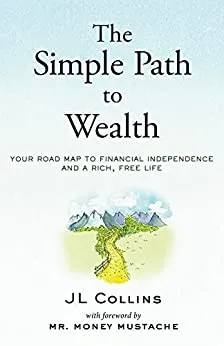
The Simple Path to Wealth: Your Road Map to Financial Independence and a Rich, Free Life
JL Collins
Amazon Rating: 4.7
Good Reads: 4.46
This book grew out of a series of letters to my daughter concerning various things – mostly about money and investing – she was not yet quite ready to hear.
Since money is the single most powerful tool we have for navigating this complex world we’ve created, understanding it is critical.
“But Dad,” she once said, “I know money is important. I just don’t want to spend my life thinking about it.” This was eye-opening. I love this stuff. But most people have better things to do with their precious time. Bridges to build, diseases to cure, treaties to negotiate, mountains to climb, technologies to create, children to teach, businesses to run.
Unfortunately, benign neglect of things financial leaves you open to the charlatans of the financial world. The people who make investing endlessly complex, because if it can be made complex it becomes more profitable for them, more expensive for us, and we are forced into their waiting arms.
Here’s an important truth: Complex investments exist only to profit those who create and sell them. Not only are they more costly to the investor, they are less effective.
The simple approach I created for her and present now to you is not only easy to understand and implement, it is more powerful than any other.
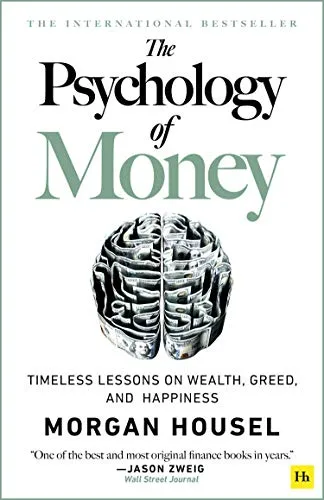
The Psychology of Money: Timeless Lessons on Wealth, Greed, and Happiness
Morgan Housel
Amazon Rating: 4.7
Good Reads: 4.40
Money – investing, personal finance, and business decisions – is typically taught as a math-based field, where data and formulas tell us exactly what to do. But in the real world people don’t make financial decisions on a spreadsheet. They make them at the dinner table, or in a meeting room, where personal history, your own unique view of the world, ego, pride, marketing, and odd incentives are scrambled together.
In The Psychology of Money, award-winning author Morgan Housel shares 19 short stories exploring the strange ways people think about money and teaches you how to make better sense of one of life’s most important topics.
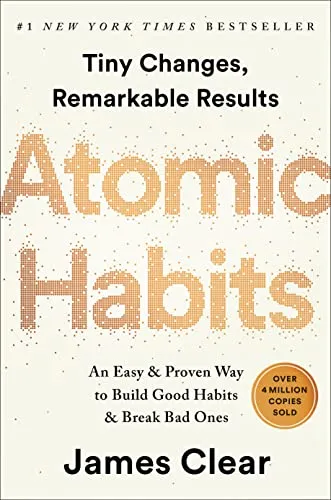
Atomic Habits: An easy & Proven Way to Build Good Habits & Break Bad Ones
James Clear
Amazon Rating: 4.8
Good Reads Rating: 4.38
No matter your goals, Atomic Habits offers a proven framework for improving–every day. James Clear, one of the world’s leading experts on habit formation, reveals practical strategies that will teach you exactly how to form good habits, break bad ones, and master the tiny behaviors that lead to remarkable results.
If you’re having trouble changing your habits, the problem isn’t you. The problem is your system. Bad habits repeat themselves again and again not because you don’t want to change, but because you have the wrong system for change. You do not rise to the level of your goals. You fall to the level of your systems. Here, you’ll get a proven system that can take you to new heights.
Clear is known for his ability to distill complex topics into simple behaviors that can be easily applied to daily life and work. Here, he draws on the most proven ideas from biology, psychology, and neuroscience to create an easy-to-understand guide for making good habits inevitable and bad habits impossible. Along the way, readers will be inspired and entertained with true stories from Olympic gold medalists, award-winning artists, business leaders, life-saving physicians, and star comedians who have used the science of small habits to master their craft and vault to the top of their field.
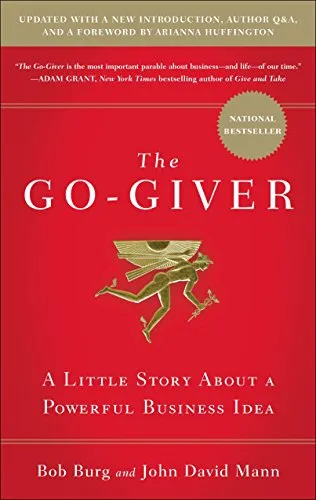
The Go-Giver: A Little Story About a Powerful Business Idea
Bob Burg
Amazon Rating: 4.8
Good Reads Rating: 4.34
“Most people just laugh when they hear that the secret to success is giving…. Then again, most people are nowhere near as successful as they wish they were.” The Go-Giver tells the story of an ambitious young man named Joe who yearns for success. Joe is a true go-getter, though sometimes he feels as if the harder and faster he works, the further away his goals seem to be. Desperate to land a key sale at the end of a bad quarter, he seeks advice from the enigmatic Pindar, a legendary consultant referred to by his many devotees sim¬ply as the Chairman.
Over the next week, Pindar introduces Joe to a series of “go-givers”: a restaurateur, a CEO, a financial adviser, a real estate broker, and the “Connector” who brought them all together. Pindar’s friends teach Joe the Five Laws of Stratospheric Success and help him open himself up to the power of giving. Joe learns that changing his focus from getting to giving – putting others’ interests first and continually adding value to their lives – ultimately leads to unexpected returns.
Imparted with wit and grace, The Go-Giver is a classic best seller that brings to life the old proverb “give and you shall receive.” Nearly a decade since its original publication, the term “go-giver” has become shorthand for a defining set of values embraced by hundreds of thousands of people around the world. Today, this timeless story continues to help its readers and listeners find fulfillment and greater success in business, in their personal lives, and in their communities. This expanded edition includes the text of the original business parable, a new introduction, a discussion guide, and a Q&A with the authors.
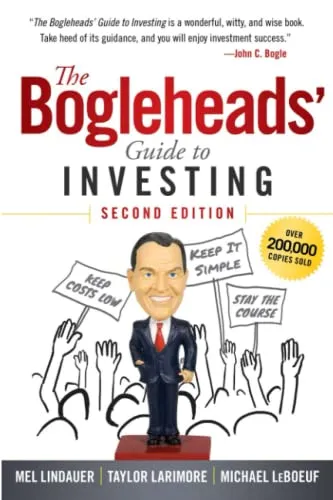
The Bogleheads’ Guide to Investing
Mel Lindauer, Taylor Larimore, Michael LeBoeuf
Amazon Rating: 4.7
Good Reads: 4.29
The Boglehead’s Guide to Investing is a DIY handbook that espouses the sage investment wisdom of John C. Bogle. This witty and wonderful book offers contrarian advice that provides the first step on the road to investment success, illustrating how relying on typical “common sense” promoted by Wall Street is destined to leave you poorer. This updated edition includes new information on backdoor Roth IRAs and ETFs as mainstream buy and hold investments, estate taxes and gifting, plus changes to the laws regarding Traditional and Roth IRAs, and 401k and 403b retirement plans. With warnings and principles both precisely accurate and grandly counterintuitive, the Boglehead authors show how beating the market is a zero-sum game.
Investing can be simple, but it’s certainly not simplistic. Over the course of twenty years, the followers of John C. Bogle have evolved from a loose association of investors to a major force with the largest and most active non-commercial financial forum on the Internet. The Boglehead’s Guide to Investing brings that communication to you with comprehensive guidance to the investment prowess on display at Bogleheads.org. You’ll learn how to craft your own investment strategy using the Bogle-proven methods that have worked for thousands of investors.
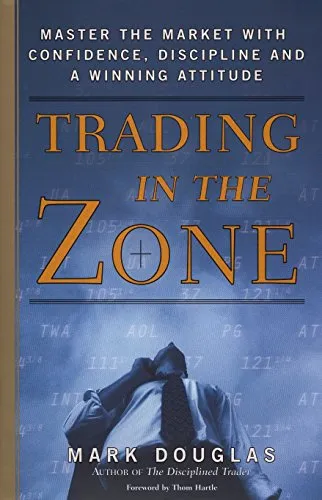
Trading in the Zone
Mark Douglas
Amazon Rating: 4.7
Good Reads: 4.27
Douglas uncovers the underlying reasons for lack of consistency and helps traders overcome the ingrained mental habits that cost them money. He takes on the myths of the market and exposes them one by one teaching traders to look beyond random outcomes, to understand the true realities of risk, and to be comfortable with the “probabilities” of market movement that governs all market speculation.
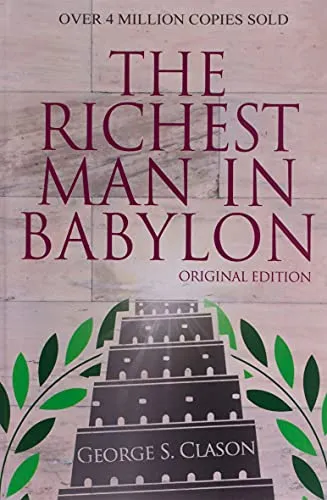
The Richest Man in Babylon
George S. Clason
Amazon Rating: 4.8
Good Reads: 4.26
The Richest Man in Babylon, based on “Babylonian parables”, has been hailed as the greatest of all inspirational works on the subject of thrift, financial planning, and personal wealth. In simple language, these fascinating and informative stories set you on a sure path to prosperity and its accompanying joys. A celebrated bestseller, it offers an understanding and a solution to your personal financial problem. Revealed inside are the secrets to acquiring money, keeping money, and making money earn more money.
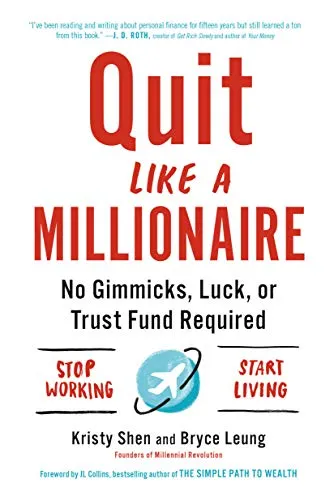
Quit like a Millionaire: No Gimmicks, Luck, or Trust Fund Required
Kristy Shen, Bryce Leung
Amazon Rating: 4.7
Good Reads Rating: 4.26
A bull***t-free guide to growing your wealth, retiring early, and living life on your own terms
Kristy Shen retired with a million dollars at the age of 31, and she did it without hitting a home run on the stock market, starting the next Snapchat in her garage, or investing in hot real estate. Learn how to cut down on spending without decreasing your quality of life, build a million-dollar portfolio, fortify your investments to survive bear markets and black-swan events, and use the four percent rule and the Yield Shield – so you can quit the rat race forever. Not everyone can become an entrepreneur or a real estate baron; the rest of us need Shen’s mathematically proven approach to retire decades before 65.
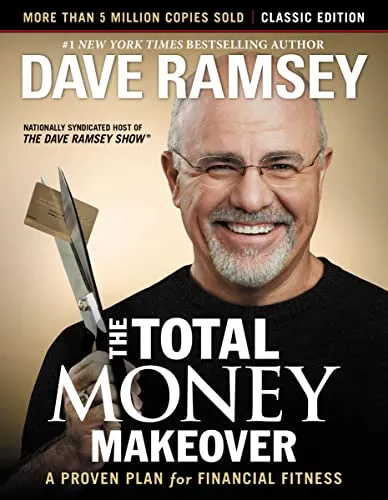
Total Money Makeover: A Proven Path for Financial Fitness
Dave Ramsey
Amazon Rating: 4.7
Good Reads: 4.24
Okay, folks, do you want to turn those fat and flabby expenses into a well-toned budget? Do you want to transform your sad and skinny little bank account into a bulked-up cash machine? Then get with the program, people. There’s one sure way to whip your finances into shape, and that’s with The Total Money Makeover. It’s the simplest, most straight-forward game plan for completely making over your money habits. And it’s based on results, not pie-in-the-sky fantasies.
Where Financial Peace gave you the solid saving and investing principles, this book puts those principles into practice. You’ll be exercising your financial strength every day and quickly freeing yourself of worry, stress, and debt. And that’s a beautiful feeling.
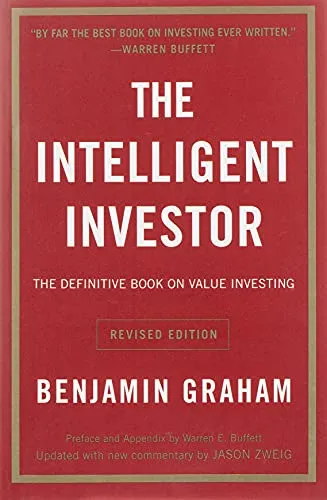
The Intelligent Investor
Benjamin Graham
Amazon Rating: 4.7
Good Reads Rating: 4.24
The Classic Text Annotated to Update Graham’s Timeless Wisdom for Today’s Market Conditions
The greatest investment advisor of the 20th century, Benjamin Graham taught and inspired people worldwide. Graham’s philosophy of “value investing” – which shields investors from substantial error and teaches them to develop long-term strategies – has made The Intelligent Investor the stock market Bible ever since its original publication in 1949.
Over the years, market developments have proven the wisdom of Graham’s strategies. While preserving the integrity of Graham’s original text, this revised edition includes updated commentary by noted financial journalist Jason Zweig, whose perspective incorporates the realities of today’s market, draws parallels between Graham’s examples and today’s financial headlines, and gives listeners a more thorough understanding of how to apply Graham’s principles.
Think Like a Breadwinner: A Wealth-Building Manifesto for Women Who Want to Earn More
Jennifer Barrett
Amazon Rating: 4.9
Good Reads: 4.2
A new kind of manifesto for the working woman, with tips on building wealth and finding balance, as well as inspiration for harnessing the freedom and power that comes from a breadwinning mindset.
Nearly half of working women in the United States are now their household’s main breadwinner. And yet, the majority of women still aren’t being brought up to think like breadwinners. In fact, they’re actually discouraged – by institutional bias and subconscious beliefs – from building their own wealth, pursuing their full earning potential, and providing for themselves and others financially. The result is that women earn less, owe more, and have significantly less money saved and invested for the future than men do. And if women do end up the main breadwinners, they’ve been conditioned to feel reluctant and unprepared to manage the role.
In Think Like a Breadwinner, financial expert Jennifer Barrett reframes what it really means to be a breadwinner. By dismantling the narrative that women don’t – and shouldn’t – take full financial responsibility to create the lives they want, she reveals not only the importance of women building their own wealth, but also the freedom and power that comes with it. With concrete practical tools, as well as examples from her own journey, Barrett encourages women to reclaim, rejoice in, and aspire to the role of breadwinner like never before.
How to Win Friends and Influence People
Dale Carnegie
Amazon Rating: 4.7
Good Reads: 4.21
You can go after the job you want…and get it! You can take the job you have…and improve it! You can take any situation you’re in…and make it work for you!
Simon & Schuster Audio is proud to present one of the best-selling books of all time, Dale Carnegie’s perennial classic How to Win Friends and Influence People, presented here in its entirety. For over 60 years the rock-solid, time-tested advice in this audiobook has carried thousands of now-famous people up the ladder of success in their business and personal lives. There is room at the top when you know…How to Win Friends and Influence People.
Think and Grow Rich
Napoleon Hill
Amazon Rating: 4.7
Good Reads: 4.18
Think and Grow Rich is the number-one inspirational and motivational classic for individuals who are interested in furthering their lives and reaching their goals by learning from important figures in history. The text read in this audiobook is the original 1937 edition written by Napoleon Hill and inspired by Andrew Carnegie, and while it has often been reproduced, no updated version has ever been able to compete with the original. It has been used as a roadmap to achievement by countless individuals.
The 13 Steps to Riches described in this audiobook offer the shortest dependable philosophy of individual achievement ever presented for the benefit of the man or woman who is searching for a definite goal in life. It comes directly from the experiences of hundreds of America’s most successful men.
Hill interviewed 504 people, including Ford, Wrigley, Wanamaker, Eastman, Rockefeller, Edison, Woolworth, Darrow, Burbank, Morgan, Firestone, and three United States presidents. The process of conducting these interviews required an investment of 20 years of Napoleon Hill’s life.
This audiobook will guide many to success and has sold millions of printed copies for nearly three quarters of a century. Yes, one can gather from the title that the starting place for wealth is in a person’s thoughts – and this title is the source for most of today’s motivational speakers. So why not go back to the original source?
Thinking Fast and Slow
Daniel Kahneman
Amazon Rating: 4.6
Good Reads Rating: 4.17
The guru to the gurus at last shares his knowledge with the rest of us. Nobel laureate Daniel Kahneman’s seminal studies in behavioral psychology, behavioral economics, and happiness studies have influenced numerous other authors, including Steven Pinker and Malcolm Gladwell. In Thinking, Fast and Slow, Kahneman at last offers his own, first book for the general public. It is a lucid and enlightening summary of his life’s work. It will change the way you think about thinking.
Two systems drive the way we think and make choices, Kahneman explains: System One is fast, intuitive, and emotional; System Two is slower, more deliberative, and more logical. Examining how both systems function within the mind, Kahneman exposes the extraordinary capabilities as well as the biases of fast thinking and the pervasive influence of intuitive impressions on our thoughts and our choices. Engaging the reader in a lively conversation about how we think, he shows where we can trust our intuitions and how we can tap into the benefits of slow thinking, contrasting the two-system view of the mind with the standard model of the rational economic agent.
Kahneman’s singularly influential work has transformed cognitive psychology and launched the new fields of behavioral economics and happiness studies. In this path-breaking book, Kahneman shows how the mind works, and offers practical and enlightening insights into how choices are made in both our business and personal lives – and how we can guard against the mental glitches that often get us into trouble.
Just Keep buying: Proven Ways to Save Money and Build Your Wealth
Nick Maggiulli
Amazon Rating: 4.5
Good Reads Rating: 4.18
Everyone faces big questions when it comes to money: questions about saving, investing, and whether you’re getting it right with your finances. Unfortunately, many of the answers provided by the financial industry have been based on belief and conjecture rather than data and evidence―until now.
I will Teach you to be Rich: No Guilt. No Excuses. No BS. Just a 6-Week Program That Works
Ramit Sethi
Amazon Rating: 4.7
Good Reads Rating: 4.13
Buy as many lattes as you want. Spend extravagantly on the things you love. Live your rich life instead of tracking every last expense with Ramit Sethi’s simple, powerful, and effective six-week program for gaining control over your finances.
This isn’t typical advice from a money expert. In this completely updated second edition, Ramit teaches you how to choose long-term investments and the right bank accounts. With his characteristic no-BS perspective, he shows how to squeeze every hidden benefit out of your credit cards. Crush debt and student loans. Learn the exact words to negotiate a raise. Set up an automatic payment system and get on with your life. Plus, new material on overcoming psychological barriers, love and money, new investments options, and real audience stories of how applying Ramit’s principles led to a rich life.
A Random Walk Down Wall Street: The Time-Tested Strategy for Successful Investing
Burton G. Malkiel
Amazon Rating: 4.7
Good Reads Rating: 4.12
Whether you’re considering your first 401k contribution, contemplating retirement, or anywhere in between, A Random Walk Down Wall Street is the best investment guide money can buy. In this new edition, Burton G. Malkiel shares authoritative insights spanning the full range of investment opportunities―including valuable new material on cryptocurrencies like bitcoin, and “tax-loss harvesting”―to help you chart a calm course through the turbulent waters of today’s financial markets.
Common Stocks and Uncommon Profits
Philip A. Fisher
Amazon Rating: 4.6
Good Reads Rating: 4.13
Widely respected and admired, Philip Fisher is among the most influential investors of all time. His investment philosophies, introduced almost forty years ago, are not only studied and applied by today’s financiers and investors, but are also regarded by many as gospel. This book is invaluable reading and has been since it was first published in 1958. The updated paperback retains the investment wisdom of the original edition and includes the perspectives of the author’s son Ken Fisher, an investment guru in his own right in an expanded preface and introduction
Rich Dad Poor Dad
Robert T. Kiyosaki
Amazon Rating: 4.7
Good Reads Rating: 4.11
Rich Dad Poor Dad is Robert’s story of growing up with two dads – his real father and the father of his best friend, his rich dad – and the ways in which both men shaped his thoughts about money and investing. The book explodes the myth that you need to earn a high income to be rich and explains the difference between working for money and having your money work for you. 20 Years… 20/20 Hindsight
In the 20th anniversary edition of this classic, Robert offers an update on what we’ve seen over the past 20 years related to money, investing, and the global economy. Sidebars throughout the book will take listeners “fast forward” – from 1997 to today – as Robert assesses how the principles taught by his rich dad have stood the test of time.
In many ways, the messages of Rich Dad Poor Dad, messages that were criticized and challenged two decades ago, are more meaningful, relevant and important today than they were 20 years ago.
Rich Dad Poor Dad…
Explodes the myth that you need to earn a high income to become rich
Challenges the belief that your house is an asset
Shows parents why they can’t rely on the school system to teach their kids about money
Defines once and for all an asset and a liability
Teaches you what to teach your kids about money for their future financial success
Finance for the People
Paco de Leon
Amazon Rating: 4.6
Good Reads Rating: 4.07
An illustrated, practical guide to navigating your financial life, no matter your financial situation.
We are all weird about money. Whether you have a lot or a little, your feelings and beliefs about money have been shaped by a combination of silence (or even shame) around talking about money, personal experiences, family and societal expectations, and a whole big complex system rigged against many of us from the start. Begin with that baseline premise and it’s no surprise so many of us find it so difficult to save enough money (but way too easy to get trapped in ballooning credit card debt), emotionally draining to deal with student loans, and nearly impossible to understand the esoteric world of investing.
Unlike most personal finance books that focus on skills and behaviors, Finance for the People asks you to examine your beliefs and experiences around money – blending extremely practical exercises with mindfulness and including more than 50 illustrations and diagrams to make the concepts accessible (and even fun). With deep insider expertise from years spent in many different corners of the financial industry, Paco de Leon is a friendly, approachable, and wise guide who invites listeners to change their relationship with money.
The Energy of Money: A Spiritual Guide to Financial and Personal Fulfillment
Maria Nemeth Ph.D
Amazon Rating: 4.6
Good Reads: 4.06
“Money is congealed energy,” said Joseph Campbell. And releasing it releases life’s possibilities. . . .
Thousands of people worldwide have learned how to build a powerful new relationship with their money and bring their dreams to fruition through Dr. Maria Nemeth’s dynamic workshops. Now you can, too. In The Energy of Money, Dr. Nemeth—who received an Audio Publishers Award for her Sounds True series on which this book is based—draws upon her more than twenty years’ experience in synthesizing spiritual and practical techniques for managing yourself and your work.
The Millionaire Next Door: The Surprising Secrets of America’s Wealthy
Cotter Smith
Amazon Rating: 4.7
Good Reads: 4.05
Who are the rich in this country? What do they do? How do they invest? How did they get rich? Can you ever become one of them? Get the answers in The Millionaire Next Door, the never-before-told story about wealth in America. You’ll be surprised by what you find out.
Raising Financially Fit Kids
Joline Godfrey
Amazon Rating: 4.6
Good Reads Rating: 4.01
In this updated edition of Raising Financially Fit Kids, Joline Godfrey shares knowledge gleaned from two decades of preparing children and families for financial independence and stewardship, philanthropic effectiveness, and meaningful economic lives. At the heart of the book are three big ideas:
• Financial education is not just about the money; it’s
about building great families and raising self-confident kids who have the tools to realize their dreams.
• Financial sustainability means living within one’s means and acquiring skills to create and manage human and financial capital.
• Giving wisely is a global citizen’s responsibility.
Designed for parents, grandparents, mentors, advisors, and educators, Raising Financially Fit Kids uses ten core money skills applied across five developmental life stages: children, tweens, middle schoolers, high schoolers, and twenty-somethings. Each stage includes age-appropriate activities that make financial fitness fun, from mall scavenger hunts to financial film festivals.
Love Your Life, Not Theirs: 7 Money Habits for Living the Life You Want
Rachel Cruze
Amazon Rating: 4.7
Good Reads Rating: 3.98
Rachel Cruze shines a spotlight on the most damaging money habit we have: comparing ourselves to others. Then she unpacks seven essential money habits for living the life we really want – a life in line with our values, where we can afford the things we want to buy without being buried under debt, stress, and worry. The Joneses are broke. Life looks good, but hidden beneath that glossy exterior are credit card bills, student loans, car payments, and an out-of-control mortgage. Their money situation is a mess, and they’re trying to live a life they simply can’t afford. So why exactly do we try so hard to keep up with the Joneses? Are we really living the lives we want, or are we chasing someone else’s dream, just trying to keep up appearances on social media, at church, and in our community? Why are we letting other people set the pace for our own family’s finances?
In Love Your Life, Not Theirs, Rachel shows you how to buy and do the things that are important to you – the right way. That starts by choosing to quit the comparisons, reframing the way you think about money, and developing new habits like avoiding debt, living on a plan, watching your spending, saving for the future, having healthy conversations about money, and giving.
These habits work, and Rachel is living proof. Now, she wants to empower you to live the life you’ve always dreamed of without creating the debt, stress, and worry that are all too often part of the deal. Social media isn’t real life and trying to keep up with the Joneses will never get you anywhere. It’s time to live – and love – your life, not theirs.
Debt Free Degree: The Step-by-Step Guide to Getting Your Kid Through College Without Student Loans
Anthony ONeal
Good Reads 4.7
Good Reads: 3.96
That’s why they send them to college! But most parents struggle to pay for school and end up turning to student loans. That’s why most graduates walk away with $35,000 in student loan debt and no clue what that debt will really cost them.
Your Money or Your Life
Vicki Robin
Amazon Rating: 4.5
Good Reads: 4.01
For more than 25 years, Your Money or Your Life has been considered the go-to book for taking back your life by changing your relationship with money. Hundreds of thousands of people have followed this nine-step program, learning to live more deliberately and meaningfully with Vicki Robin’s guidance.
This fully revised and updated edition with a foreword by “the Frugal Guru” (The New Yorker) Mr. Money Mustache is the ultimate makeover of this best-selling classic, ensuring that its time-tested wisdom applies to people of all ages and covers modern topics like investing in index funds, managing revenue streams like side hustles and freelancing, tracking your finances online, and having difficult conversations about money.
Financial Freedom: A Proven Path to All the Money You Will Ever Need
Grant Sabatier
Amazon Rating: 4.6
Good Reads: 3.96
Money is unlimited. Time is not. Become financially independent as fast as possible.
In 2010, 24-year-old Grant Sabatier woke up to find he had $2.26 in his bank account. Five years later, he had a net worth of over $1.25 million, and CNBC began calling him “the Millennial Millionaire”. By age 30, he had reached financial independence. Along the way, he uncovered that most of the accepted wisdom about money, work, and retirement is either incorrect, incomplete, or so old-school it’s obsolete.
Financial Freedom is a step-by-step path to make more money in less time, so you have more time for the things you love. It challenges the accepted narrative of spending decades working a traditional nine-to-five job, pinching pennies, and finally earning the right to retirement at age 65, and instead offers listeners an alternative: Forget everything you’ve ever learned about money so you can actually live the life you want. Financial Freedom is not merely a laundry list of advice to follow to get rich quick – it’s a practical road map to living life on one’s own terms, as soon as possible.
The Automatic Millionaire
David Bach
Amazon Rating: 4.6
Good Reads: 3.94
What’s the secret to becoming a millionaire? For years people have asked David Bach, the national bestselling author of Smart Women Finish Rich, Smart Couples Finish Rich, and Start Late, Finish Rich what’s the real secret to getting rich? What’s the one thing I need to do? Now, in the newly revised The Automatic Millionaire, expanded and updated, David Bach is sharing that secret.
The Automatic Millionaire starts with the powerful story of an average American couple–he’s a low-level manager, she’s a beautician–whose joint income never exceeds $55,000 a year, yet who somehow manage to own two homes debt-free, put two kids through college, and retire at 55 with more than $1 million in savings. Through their story you’ll learn the surprising fact that you cannot get rich with a budget! You have to have a plan to pay yourself first that is totally automatic, a plan that will automatically secure your future and pay for your present. This powerful little book has the potential to secure your financial future. Do it once–the rest is automatic!
The Money Game
Adam Smith
Amazon Rating: 4.3
Good Reads: 3.99
This essential book takes listeners to the Street to learn about the intricacies of money and how the stock market impacts every area of our lives. According to the author, the key to making wise, lucrative investments is knowing ourselves. In witty, easily accessible language, he shares pithy insights about the role of intuition and the psychology of guilt, arguing that there is no substitute for information. Smith’s Irregular Rules shatter common myths and misconceptions, revealing why nothing works all the time and illustrating how greed and fear fuel the market.
Readers will learn about the safest types of investing, the key to following market trends, and how to capitalize growth, gleaning tips on stock movers, winners and losers, and much more. Peppered with entertaining and prescient anecdotes, The Money Game analyzes who makes the really big money and explores the meaning of our desire to become rich. From selling short and buying long to Wall Street’s crowd mentality, from what constitutes a random walk to why timing is everything, this is the definitive portrait of the Street, then and now.
Baby Steps Millionaires
Dave Ramsey
Amazon Rating: 4.5
Good Reads Rating: 3.92
Most people know Dave Ramsey as the guy who did stupid with a lot of zeros on the end. He made his first million in his twenties—the wrong way—and then went bankrupt. That’s when he set out to learn God’s ways of managing money and developed the Ramsey Baby Steps. Following these steps, Dave became a millionaire again—this time the right way. After three decades of guiding millions of others through the plan, the evidence is undeniable: if you follow the Baby Steps, you will become a millionaire and get to live and give like no one else.
Broke Millennial
Erin Lowry
Amazon Rating: 4.6
Good Reads Rating: 3.91
If you’re a cash-strapped 20- or 30-something, it’s easy to get freaked out by finances. But you’re not doomed to spend your life drowning in debt or mystified by money. It’s time to stop scraping by and take control of your money and your life with this savvy and smart guide.
Broke Millennial shows step-by-step how to go from flat-broke to financial badass. Unlike most personal finance books out there, it doesn’t just cover boring stuff like credit card debt, investing, and dealing with the dreaded “B” word (budgeting). Packed with refreshingly simple advice and hilarious true stories, Broke Millennial is the essential roadmap every financially clueless millennial needs to become a money master. So what are you waiting for? Let’s #GYFLT!
The Index Card: Why Personal Finance Doesn’t Have to Be Complicated
Helaine Olen, Harold Pollack
Amazon Rating: 4.6
Good Reads: 3.9
TV analysts and money managers would have you believe your finances are enormously complicated, and if you don’t follow their guidance, you’ll end up in the poorhouse.
They’re wrong.
When University of Chicago professor Harold Pollack interviewed Helaine Olen, an award-winning financial journalist and the author of the bestselling Pound Foolish, he made an off¬hand suggestion: everything you need to know about managing your money could fit on an index card. To prove his point, he grabbed a 4″ x 6″ card, scribbled down a list of rules, and posted a picture of the card online. The post went viral.
Now, Pollack teams up with Olen to explain why the ten simple rules of the index card outperform more complicated financial strategies. Inside is an easy-to-follow action plan that works in good times and bad, giving you the tools, knowledge, and confidence to seize control of your financial life.
Stacked: Your Super-Serious Guide to Modern Money Management
Joe Saul-Sehy
Amazon Rating: 4.7
Good Reads Rating: 3.88
rom the money nerds behind the award-winning Stacking Benjamins podcast, a new kind of personal finance book to get your house in order.
Rich. Wealthy. Well-heeled. Moneyed. Affluent. Not bad—but why not get Stacked instead? If you’ve ever dreamed of a basic philosophy of money that’ll help you live bigger, be bolder, and laugh harder, you need this book.
In these uncertain times, the basics matter more than ever. But for most of us, concepts such as investing, budgeting, and getting out of debt just don’t float our boats (or 150-foot yachts)—and so we put them off longer than we should. Joe Saul-Sehy and Emily Guy Birken are here to tell you that personal finance can be a lot more fun than you think. (No haberdashery, maritime knowledge, or specialized flatware required.)
Learn about everything from side hustles, to hiring a legit financial adviser, to planning for emergencies, to what’s new and exciting—and actually worth your time—in financial apps and software. If you’re looking for the same old get-rich-quick clichés, avocado toast shaming, or alphabet soup of incomprehensible financial terms, you won’t find them here. Instead, Saul-Sehy and Birken take you step by step along the way to financial success, with their signature blend of shrewd financial information and wacky humor.
Die with Zero: Getting All You Can from Your Money and Your Life
Bill Perkins
Amazon Rating: 4.5
Good Reads Rating: 3.86
Imagine if by the time you died, you did everything you were told to. You worked hard, saved your money, and looked forward to financial freedom when you retired.
The only thing you wasted along the way was . . . your life.
Die with Zero presents a startling new and provocative philosophy as well as practical guide on how to get the most out of your money—and out of your life. It’s intended for those who place lifelong memorable experiences far ahead of simply making and accumulating money for one’s so-called “golden years.”
In short, Bill Perkins wants to rescue you from over-saving and under-living. Regardless of your age, Die with Zero will teach you Perkins’s plan for optimizing your life, stage by stage, so you’re fully engaged and enjoying what you’ve worked and saved for.
You’ll discover how to maximize your lifetime memorable moments with “time-bucketing,” how to convert your earnings into priceless memories by following your “net worth curve,” and how to navigate decisions about whether to invest in, or delay, a meaningful adventure with your “fulfillment curve” and “personal interest rate.”
Using his own life experiences as well as the inspiring stories and cautionary tales of others—and drawing on eye-opening insights about time, money, and happiness from psychological science and behavioral finance—Perkins makes a timely, convincing, and contrarian case for living large.
Start Your F.I.R.E. (Financial Independence Retire Early): A Modern Guide to Early Retirement
Dylin Redling
Amazon Rating: 4
Good Reads: 3.84
Living your best life someday starts with saving smarter for retirement. Start Your F.I.R.E.: A Modern Guide to Early Retirement can help by giving you the most direct approach to success and security. It’s a perfect addition to what you’re probably already doing, including a 401(k), Roth IRA, or even a basic savings account.
Featuring customizable principles and in-depth insights, this all-in-one retirement plan delivers a clear, concise path to financial freedom through smart spending, low-risk investing, creating multiple incomes, and maximizing savings. Ultimately, this guide can help you take control of your career, your finances, and your life, so you can reach your goals with confidence. Financial independence and early retirement are within reach―with the F.I.R.E. approach.
Nudge
Richard H. Thaler
Amazon Rating: 4.4
Good Reads Rating: 3.83
Since the original publication of Nudge more than a decade ago, the word “nudge” has entered the vocabulary of businesspeople, policymakers, engaged citizens, and consumers everywhere. The book has given rise to more than 200 “nudge units” in governments around the world and countless groups of behavioral scientists in every part of the economy. It has taught us how to use thoughtful “choice architecture”—a concept the authors invented—to help us make better decisions for ourselves, our families, and our society.
Now, the authors have rewritten the book from cover to cover, making use of their experiences in and out of government over the past dozen years as well as the explosion of new research in numerous academic disciplines.
It offers a wealth of new insights, for both its avowed fans and newcomers to the field, about a wide variety of issues that we face in our daily lives—COVID-19, health, personal finance, retirement savings, credit card debt, home mortgages, medical care, organ donation, climate change, and “sludge” (paperwork and other nuisances that we don’t want and keep us from getting what we do want)—all while honoring one of the cardinal rules of nudging: make it fun!
Why Didn’t They Teach Me This in School?
Cary Siegel
Amazon Rating: 4.5
Good Reads: 3.82
Why do high schools and colleges require students to take courses in English, math and science, yet have absolutely no requirements for students to learn about personal money management? Why Didn’t They Teach Me This in School? 99 Personal Money Management Lessons to Live By was initially developed by the author to pass on to his five children as they entered adulthood. As it developed, the author realized that personal money management skills were rarely taught in high schools, colleges, and even in MBA programs.
Unfortunately, books on the subject tend to be complicated and lengthy. This book includes eight important lessons focusing on 99 principles that will quickly and memorably enhance any individual’s money management acumen. Unlike many of the personal money management books out there, this book is a quick, easily digested listen that focuses more on the qualitative side than the quantitative side of personal money management.
These principles are not from a text book. Rather, they are practical principles learned by the author as he navigated through his financial life. Many are unorthodox in order to be memorable and provoke deeper thought by the listener. Not only an excellent graduation gift for high school and college students but also a great book for any adult!
Clever Girl Finance: Ditch Debt, Save Money and Build Real Wealth
Bola Sokunbi
Amazon Rating: 4.5
Good Reads Rating: 3.80
Join the ranks of thousands of smart and savvy women who have turned to money expert and author Bola Sokunbi for guidance on ditching debt, saving money, and building real wealth. Sokunbi, the force behind the hugely popular Clever Girl Finance website, draws on her personal money mistakes and financial redemption to educate and empower a new generation of women on their journey to financial freedom. Lighthearted and accessible, Clever Girl Finance encourages women to talk about money and financial wellness and shows them how to navigate their own murky financial waters and come out afloat on the other side.
Monitor your expenses, build a budget, and stick with it. Make the most of a modest salary and still have money to spare. Keep your credit in check and clean up credit card chaos. Start and succeed at your side hustle. Build a nest egg and invest in your future. Transform your money mindset and be accountable for your financial well-being. Feel the power of real-world stories from other “clever girls.”
Put yourself on the path to financial success with the valuable lessons learned from Clever Girl Finance.
Designing your new work life: How to Thrive and Change and Find Happiness–And a New Freedom–At Work
Bill Burnett
Amazon Rating: 4.5
Good Reads: 3.81
In Designing Your New Work Life, Burnett and Evans show us how design thinking can transform our present job, and how it can improve our experience of work in times of disruption. All disruption is personal, write Burnett and Evans, as with the life-altering global pandemic we are living through now. Designing Your New Work Life makes clear that disruption is the new normal, that it is here to stay and that it is accelerating. And in the book’s new chapters, Burnett and Evans show us step by step, how to design our way through disruption and how to stay ahead of it—and thrive.
Burnett and Evans’s Disruption Design offers us a radical new concept that makes use of the designer mindsets: Curiosity, Reframing, Radical collaboration, Awareness, Bias to action, Storytelling, to find our way through these unchartered times.
In Designing Your New Work Life, Burnett and Evans show us, with tools, tips, and design ideas, how we can make new possibilities available even when our lives have been disrupted (be it globally, regionally, or personally), giving us the tools to enjoy the present moment and allowing us to begin to prototype our possible future.
Dollars and Sense: How We Misthink Money and How to Spend Smarter
Dan Ariely, Jeff Kreisler
Amazon Rating: 4.5
Good Reads: 3.78
Blending humor and behavioral economics, the New York Times best-selling author of Predictably Irrational delves into the truly illogical world of personal finance to help people better understand why they make bad financial decisions and gives them the knowledge they need to make better ones.
Why does paying for things often feel like it causes physical pain?
Why does it cost you money to act as your own real estate agent?
Why are we comfortable overpaying for something now just because we’ve overpaid for it before?
In Dollars and Sense, world-renowned economist Dan Ariely answers these intriguing questions and many more as he explains how our irrational behavior often interferes with our best intentions when it comes to managing our finances. Partnering with financial comedian and writer Jeff Kreisler, Ariely takes us deep inside our minds to expose the hidden motivations that are secretly driving our choices about money.
Exploring a wide range of everyday topics – from credit card debt and household budgeting to holiday sales – Ariely and Kreisler demonstrate how our ideas about dollars and cents are often wrong and cost us more than we know. Mixing case studies and anecdotes with tangible advice and lessons, they cut through the unconscious fears and desires driving our worst financial instincts and teach us how to improve our money habits.
Fascinating, engaging, funny, and essential, Dollars and Sense is a sound investment, providing us with the practical tools we need to understand and improve our financial choices, save and spend smarter, and ultimately live better.
The Dumb Things Smart People do With Their Money
Jill Schlesinger
Amazon Rating: 4.5
Good Reads: 3.77
You’re smart. So don’t be dumb about money. Pinpoint your biggest money blind spots and take control of your finances with these tools from CBS News Business Analyst and host of the nationally syndicated radio show Jill on Money, Jill Schlesinger.
Hey you . . . you saw the title. You get the deal. You’re smart. You’ve made a few dollars. You’ve done what the financial books and websites tell you to do. So why isn’t it working? Maybe emotions and expectations are getting in the way of good sense—or you’re paying attention to the wrong people. If you’ve started counting your lattes, for god’s sake, just stop. Read this book instead.
After decades of working as a Wall Street trader, investment adviser, and money expert for CBS News, Jill Schlesinger reveals thirteen costly mistakes you may be making right now with your money. Drawing on personal stories and a hefty dose of humor, Schlesinger argues that even the brightest people can behave like financial dumb-asses because of emotional blind spots.
So if you’ve saved for college for your kids before saving for retirement, or you’ve avoided drafting a will, this is the book for you. By following Schlesinger’s rules about retirement, college financing, insurance, real estate, and more, you can save money and avoid countless sleepless nights. It could be the smartest investment you make all year.
The One-Page Financial Plan: A Simple Way to Be Smart About Your Money
Carl Richards
Amazon Rating: 4.5
Good Reads: 3.74
Whenever I tell people about my job as a financial advisor, the conversation inevitably turns to how hopeless they feel when it comes to dealing with money. More than once, they’ve begged, “Just tell me what to do.” It’s no surprise that even my most successful friends feel confused or paralyzed. Even if they have a shelfful of personal finance books, they don’t have time to make sense of all the information available. They don’t just want good advice; they want the best advice – so rather than do the wrong thing, they do nothing. Their 401(k)s and bank statements pile up, unexamined or maybe even unopened.
What they don’t realize is that bad calls about money aren’t failures; they’re just what happens when emotional creatures have to make decisions about the future with limited information. What I tell them is that we need to scrap striving for perfection and instead commit to a process of guessing and making adjustments when things go off track. Of course we’re going to make the best guesses we can – but we’re not going to obsess over getting them exactly right.
The fact is in a single page, you can prioritize what you really want in life and figure out how to get there. That’s because a great financial plan has nothing to do with what the markets are doing, what your real estate agent is pitching, or the hot stock your brother-in-law told you about. It has everything to do with what’s most important to you.
By now you may be wondering, “What about the details? How much do I need to invest each year, and how do I allocate it? How much life insurance do I need?” Don’t worry: I’ll cover those topics and many more, sharing strategies that will take the complexity out of them. The most important thing is getting clarity about the big picture, so you can cope with the unexpected. Maybe you’ll lose the job you thought was secure; you’ll take a financial risk that doesn’t pan out; you’ll have twins when you were budgeting for only one.
The Guide to Passive Income: How Affluent Investors Build Generational Wealth
Andrew Lanoie
Amazon Rating: 4.5
Good Reads: 3.73
In an unprecedented time in the world, millions of people are realizing they can no longer count on just their 9-5 job or one stream of income. These pages contain the exact strategies Andrew Lanoie used to retire from the rat race in his 30’s. And he will teach you 11 of the best income-generating assets available today. What Andrew is talking about is truly passive income. The kind you can quite literally make in your sleep. The kind that trickles into your account each month or each quarter regardless of whether or not you even get out of bed. It’s only by generating this kind of income that you can achieve the type of financial freedom and wealth to enjoy life on your terms. With enough passive income, you can stop living a life of worry and start living one filled with abundance, confidence, and tranquility.
Kakeibo: The Japanese Art of Saving
Fumiko Chiba
Amazon Rating: 4.2
Good Reads Rating: 3.64
People in Japan are masters of minimal living, able to make do with less in all aspects of life, whether it’s de-cluttering personal belongings or savvy seasonal cooking. At the heart of all this is the kakeibo: the budgeting journal used to set savings goals and track spending. The premise is simple: at the beginning of each month, the prompts in this book help you to plan how much you would like to save and what you need to do in order to reach your goal. The kakeibo then gives you space to jot down your weekly spending and reflect on the month just gone. The act of completing your journal ensures that saving is a part of your everyday life, while also giving you the opportunity to reflect and improve every month.
Money Rules: The Simple Path to Lifelong Security
Jean Chatzky
Amazon Rating: 4.3
Good Reads Rating: 3.58
A powerfully simple, must-have manifesto on money with more than 90 wealth-building rules from the Today show’s finance guru.
In a time of great financial uncertainty, this is the book everyone must read. The bottom line: Money is simple-people make it complicated. Now, bestselling personal finance author Jean Chatzky has distilled this simplicity into a smart, immediate, and entertaining set of rules that will change readers’ financial lives.
Chatzky removes the stress associated with all things money and says it clearly: Readers who follow these basic yet crucial approaches to spending, saving, investing, increasing their income, and most importantly, protecting what they have, will build the wealth and financial stability they’ve been dreaming of.
Written in her trademark warm, witty voice, and with a special Dos and Don’ts section, Money Rules is the only book readers really need to achieve true financial health and happiness.
This is the Year I Put my Financial Life in Order
John Schwartz
Amazon Rating: 4.5
Good Reads: 3.5
Money management is one of our most practical survival skills—and also one we’ve convinced ourselves we’re either born with or not. In reality, financial planning can be learned, like anything else. Part financial memoir and part research-based guide to attaining lifelong security, This Is the Year I Put My Financial Life in Order is the book that everyone who has never wanted to read a preachy financial guide has been waiting for.
John Schwartz and his wife, Jeanne, are pre-retirement workers of an economic class well above the poverty line, but well below the one percent. Sharing his own alternately harrowing and hilarious stories—from his brush with financial ruin and bankruptcy in his thirties to his short-lived budgeted diet of cafeteria french fries and gravy—John will walk you through his own journey to financial literacy, which he admittedly started a bit late. He covers everything from investments to retirement and insurance to wills (at fifty-eight, he didn’t have one!), medical directives and more. Whether you’re a college grad wanting to start out on the right foot or you’re approaching retirement age and still wondering what a 401(K) is, This Is the Year I Put My Financial Life in Order will help you become your own best financial adviser
Financially Forward: How to Use Today’s Digital Tools to Earn More, Save Better, and Spend Smarter
Alexa von Tobel
Amazon Rating: 4
Good Reads: 3.39
We live in a new financial world. Our wallets – like every other aspect of our lives – have gone fully digital. From mobile pay to on-demand everything to cryptocurrencies, technology is rewriting the rules for how we earn, save, spend, and invest. It’s time to move Financially Forward…or get left behind.
The Six Figure Second Income: How to Start and Grow a Successful Online Business Without Quitting Your Day Job
David Lindahl, Jonathan Rozek
Amazon Rating: 4
Good Reads: 3.31
Here are proven methods for building an online income stream. Maybe you dream of making money with an online business, but haven’t tried so far because you’d have to quit your current job and enter the risky world of Internet startups. Or because you think you need lots of capital and way too much time. Or you think the field is maxed out and overcrowded. Or that you need to be age 24 – with an amazing invention to sell. Or just because the economy’s too bad right now.
If these reasons sound familiar, Dave Lindahl and Jon Rozek beg to differ. Having done so themselves, they know you can create a very significant side income online, and their new go-to guide The Six-Figure Second Income shows you exactly how!
You’re so Money
Farnoosh Torabi
Amazon Rating: 3.5
Good Reads: 3.2
Your Good Life Starts Now. Live beyond your means but spend within them.
Take your steady out for that $350 dinner after the big promotion. You might just have to eat PB&J for a week to make it happen. Splurge when it makes sense. Buy the designer jeans you can’t live without in your size, at full price. But you better walk away from last season’s must-have sweater, even if it is 75 percent off!
Make more money with your money. Invest in stocks to make the big bucks and start saving for retirement now. You want to be debt-free in your swinging sixties.
Have it all . . . just not all at once. Want a Mercedes more than anything in the world? You can make it happen . ..but probably not while sharing a summer beach house with your friends.
Finally a savvy, realistic finance book for those of us who love our Starbucks mocha lattes and Razr cell phones but don’t want our Jimmy Choo shoes or Bose headphones buried under a pile of burgeoning debt. Twenty-something financial reporter Farnoosh Torabi tells you that you can satisfy your sophisticated tastes and achieve financial bliss.
The key: prioritizing your expenses according to what you want the most—splurging when you can and saving on other things. From sensible grocery shopping (yes, you can have your organic yogurt and eat it, too!) to cyberbanking, empower yourself to live a guilt-free, Gucci- and gadget-clad good life without sacrificing financial security.

